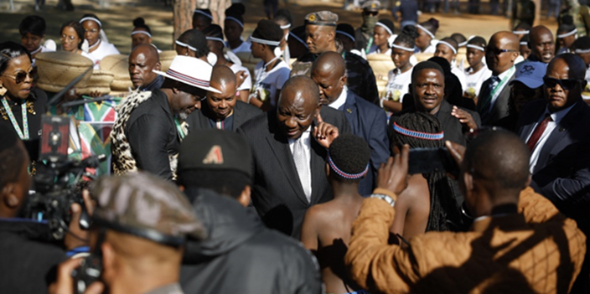A new era is beginning for South Africa and the Southern African region. In Pretoria as President Cyril Ramaphosa takes office for a second term, it will be at the head of a coalition government for the second time in South Africa’s history. The ANC lost the majority it commanded for the first time on the 29th of May.
Having governed South Africa since the country’s first democratic elections in 1994, the ANC has now formed a centrist coalition government with its main rival, the Democratic Alliance (DA), and the Inkatha Freedom Party (IFP). Various headlines described this as a new era for South Africa. While coalition rule in not unusual in southern African countries, the electoral experience of the ANC – serves as a warning to other liberation leaders not to take voters for granted. Members of Southern Africa’s national liberation movement (NLM) parties of government see themselves as the political aristocracy of the region, having earned their legitimacy to govern in perpetuity through armed struggle against colonial rule.(Chatham House)
The danger in having a political aristocracy, is that they can become elitist and do not serve the interests of democracy. The threat of one party remaining the dominant ruling force for decades leads to them becoming aloof and out of touch with the people who elected them. The ANC has now been humbled to share power with opposition parties that have more or less been observing statecraft from the side lines. The DA has never held any ministerial posts while the IFP once famously held the portfolio of the Home Affairs Department during the tenure of late President Nelson Mandela in South Africa’s first ever national unity government alongside the former National Party.
They have typically emphasized their past armed struggles to provide historical legitimacy and to build popular support. But for the populations governed by these movements, in some cases for several decades, the liberation narrative is now wearing thin. Another commonality among NLM leaders is the tendency to portray themselves as exceptional. Jacob Zuma, the South African former president, described his mandate in divine terms in May 2008: ‘Even God expects us to rule this country… it is even blessed in heaven. This is why we will rule until Jesus comes back.’ South Africa, Namibia and Zimbabwe all had independence settlements that shared two of the same fundamental characteristics: settler populations that lost political power in exchange for guarantees of rights and property; and NLMs in southern Africa that gained control of the state in an exchange for accommodation with domestic and international capital. Chatham House)
In Angola and Mozambique, everything was expropriated by the state at independence. Although there has been some gradual privatization, land remains leased by the state.(Chatham House)
Liberation movements in the southern part of the continent tended to lean left. This was because they received considerable financial and logistical support as well as training from the former Soviet Union. South Africa still has warm ties to the Russian Federation and communist China, one of the reasons why they joined BRICS. The creation of the Economic Freedom Fighters and the Umkhonto We Sizwe parties come at the time when the neighbouring regimes they took inspiration from have gone bankrupt and unstable. Mozambique and Angola have both experienced civil wars and dire poverty under growing authoritarianism. This is due to the economics they embraced. South Africa managed to dodge a bullet when the ANC took office in 1994. The other issue with NLM leaders and leaderships is that decades of fighting colonialism and other forms of authoritarianism have led them to believe themselves to be above the law. This has had dire consequences.
In Zimbabwe and Angola, the presidents believed they could rule for life. In South Africa the arrogance of the ANC led them to be frivolous in the usage of public funds, and eventually led to a loss in their popularity.
The ANC says President Cyril Ramaphosa will announce his new cabinet in the coming days after negotiations over positions with other political parties that have joined the government of national unity (GNU). The Al Jama-ah party is the latest to have joined the GNU, bringing the total number of signatories to 10, including the DA and the IFP. These 10 parties have a combined 70% of the seats in the 400-seat National Assembly.(Business Live)
Ramaphosa and the ANC may have sort to include smaller parties in the GNU, but it will take time to tell how so many parties with varying parliamentary support can fare in the new cabinet. Even if they command a majority there has to be a consensus among the partners concerning the overall state policy of the next five years. Smaller parties in the coalition may find difficulty in expressing their views over their more powerful colleagues. Its all a matter of time or faith to determine the outcome.
Article written by:
Yacoob Cassim
Journalist at Radio Al Ansaar






